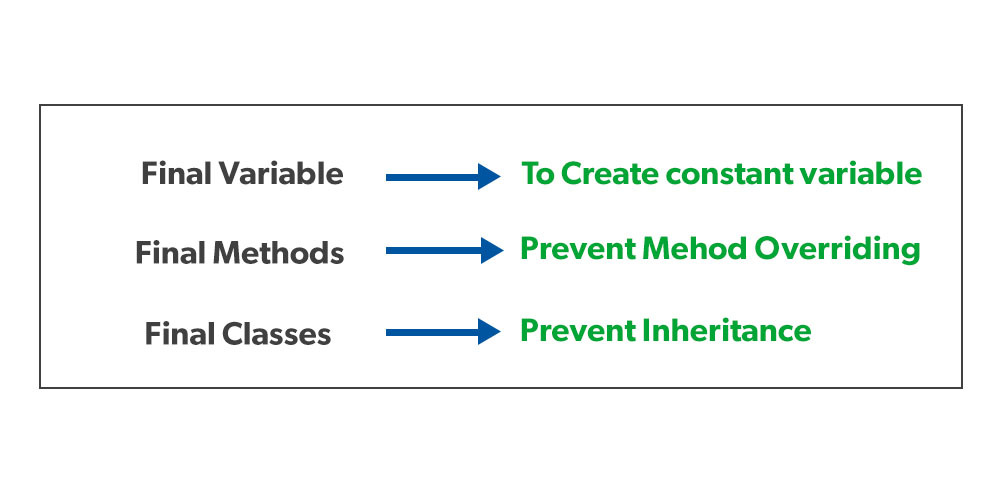final Keyword in Java
final keyword is used in different contexts. First of all, final is a non-access modifier applicable only to a variable, a method, or a class. The following are different contexts where final is used.

Characteristics of final keyword in java:
In Java, the final keyword is used to indicate that a variable, method, or class cannot be modified or extended. Here are some of its characteristics:
- Final variables: When a variable is declared as final, its value cannot be changed once it has been initialized. This is useful for declaring constants or other values that should not be modified.
- Final methods: When a method is declared as final, it cannot be overridden by a subclass. This is useful for methods that are part of a class’s public API and should not be modified by subclasses.
- Final classes: When a class is declared as final, it cannot be extended by a subclass. This is useful for classes that are intended to be used as is and should not be modified or extended.
- Initialization: Final variables must be initialized either at the time of declaration or in the constructor of the class. This ensures that the value of the variable is set and cannot be changed.
- Performance: The use of final can sometimes improve performance, as the compiler can optimize the code more effectively when it knows that a variable or method cannot be changed.
- Security: final can help improve security by preventing malicious code from modifying sensitive data or behavior.
In Java, the "final" keyword is used to declare that a variable, method, or class cannot be changed or overridden after it has been defined. There are three types of "final" declarations:
Final variables: A final variable is a constant and its value cannot be changed once it is initialized. Final variables can be initialized either at the time of declaration or in a constructor.
java
Copy code
public class Example {
final int x = 5;
final double PI;
public Example() {
PI = 3.14;
}
}
In the above example, "x" is a final variable that is initialized at the time of declaration, and "PI" is a final variable that is initialized in the constructor.
Final methods: A final method cannot be overridden by a subclass. Once a method is declared final, it cannot be modified in any way in any subclass.
java
Copy code
public class Animal {
public final void eat() {
System.out.println("Eating...");
}
}
public class Dog extends Animal {
// This method cannot override the final method in Animal class
// Will result in a compile-time error
// public void eat() { }
}
In the above example, the "eat" method in the "Animal" class is declared as final, so it cannot be overridden in the "Dog" class.
Final classes: A final class cannot be subclassed. Once a class is declared final, it cannot be extended by any other class.
kotlin
Copy code
public final class Example {
// ...
}
// This will result in a compile-time error
// public class AnotherExample extends Example { }
In the above example, the "Example" class is declared as final, so it cannot be extended by any other class.
Overall, the "final" keyword in Java is useful for ensuring that certain elements of your code cannot be changed, overridden, or extended, which can help to make your code more secure and reliable.